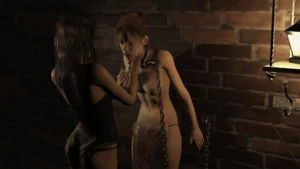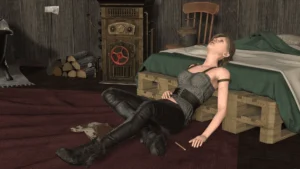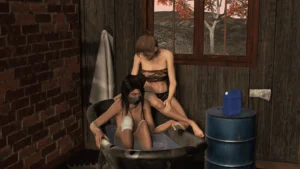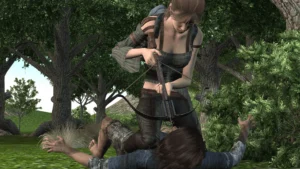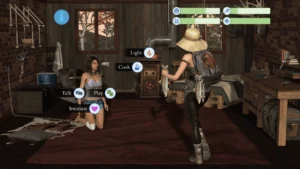
Teen Zombie in Your Cabin
Play Teen Zombie in Your Cabin
Teen Zombie in Your Cabin review
How This Visual Novel Redefines Player Choices in Post-Apocalyptic Narratives
In an oversaturated market of survival games, ‘Teen Zombie in Your Cabin’ stands out with its bold approach to character-driven storytelling. This visual novel challenges players to navigate complex moral dilemmas while managing scarce resources in a zombie-infested wilderness. Through its innovative blend of survival mechanics and emotional narrative depth, the game creates a thought-provoking experience that stays with players long after their first playthrough.
Core Gameplay Mechanics and Narrative Integration
Resource Management as Emotional Storytelling 🧟⚖️
Picture this: You’ve got one can of beans left, your cabin’s heating is failing, and outside, the undead are groaning like your stomach after skipping lunch. Teen Zombie in Your Cabin doesn’t just ask you to survive—it forces you to feel survival. The game’s survival resource allocation system isn’t about hoarding supplies; it’s about asking, “What would you sacrifice to keep someone human?”
Take the medicine dilemma early in the game. You find antibiotics that could cure a wounded survivor’s infection… or trade them for a generator part to power your defenses. Choosing between character relationships and collective safety isn’t just tactical—it’s visceral. I once gave the meds to a kid named Kai, thinking I’d earn their trust. Turns out, their “infection” was a lie, and I’d doomed my group to a freezing winter. 🥶💔
The game’s base-building mechanics mirror its themes of preserving humanity. Fixing a broken piano or planting a vegetable garden doesn’t boost stats—it rebuilds hope. These quiet moments make the moral choice system hit harder. Do you ration food fairly, or let favorites sneak extras? Your decisions ripple through the narrative branching paths, turning your cabin into either a sanctuary or a powder keg of resentment.
| Resource Choice | Relationship Impact | Long-Term Consequence |
|---|---|---|
| Share food equally | +Trust (Group) | Unlocks cooperative endings |
| Hoard medicine | -Loyalty (Individuals) | Triggers betrayal events |
| Gift personal items | +Affection (Specific NPCs) | Opens romantic subplots |
Branching Dialogue Systems That Matter 🗣️🌪️
Forget “illusion of choice”—Teen Zombie’s narrative branching paths are more like a minefield of consequences. During a raid scene, I tried to negotiate with scavengers instead of fighting. Big mistake. My pacifism got a ally killed, and suddenly, half the group wouldn’t speak to me. The character relationship meter doesn’t just track numbers; it simulates raw, messy human dynamics.
Three key decisions define your playthrough:
1. Who you rescue first during the cabin fire 🔥 (prioritize skills vs. emotional bonds)
2. Whether to reveal a character’s zombie bite 🤐 (transparency vs. panic control)
3. How you handle a stolen supply cache 🎒 (forgiveness vs. exile)
Each choice locks or unlocks multiple ending conditions, from bittersweet solos to found-family finales. The game’s average 14-hour playtime isn’t padding—it’s the price of weaving 12 distinct endings into a single apocalyptic tapestry.
Survival Mechanics With Ethical Consequences 🔪❤️
Here’s the kicker: Every survival mechanic in Teen Zombie doubles as a moral choice system. Scavenging isn’t just looting—it’s deciding whether to rob desperate strangers or risk starving. Combat isn’t about headshots; it’s about whether to kill turned friends or try (and fail) to save them.
One night, I caught a character stealing rations. The game gave me three options:
– Confront them publicly (risks group discord)
– Blackmail them privately (creates a toxic alliance)
– Look the other way (lowers your authority)
I chose blackmail, thinking I’d “controlled” the situation. Instead, it unraveled into a subplot where the thief sabotaged our defenses. The survival resource allocation system had turned my cleverness into a trap.
The genius? These narrative branching paths aren’t labeled “good” or “evil.” They’re human. Saving everyone is impossible, but how you fail—or barely succeed—becomes your story.
🧟♂️ Pro Tip: Play your first run blind. Let guilt guide you. Then replay using spreadsheets—you’ll realize just how deep the rabbit hole goes.
With multiple ending conditions tied to hidden variables (like how often you sang campfire songs or repaired a broken radio), Teen Zombie doesn’t just want your attention—it demands your humanity. And honestly? That’s why we keep coming back. To see if, this time, we can be better than the apocalypse. 🌄✨
Through its innovative fusion of survival mechanics and emotional storytelling, ‘Teen Zombie in Your Cabin’ sets a new standard for mature narrative games. The title demonstrates how interactive media can explore complex themes of humanity through gameplay systems rather than explicit content. For players seeking a thought-provoking experience that respects their intelligence, this visual novel offers multiple playthroughs worth of meaningful choices and consequences.

